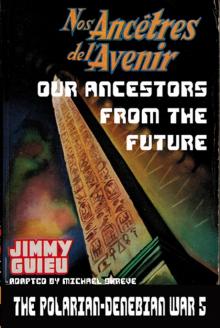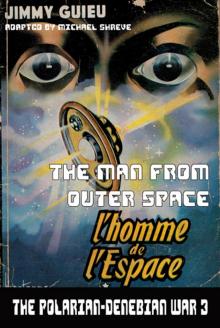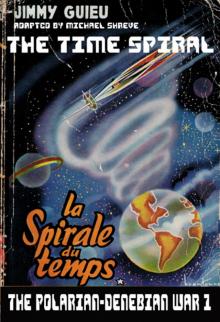- Home
- Jimmy Guieu
Polarian-Denebian War 6: Prisoners of the Past Page 5
Polarian-Denebian War 6: Prisoners of the Past Read online
Page 5
“Send an officer to headquarters with an order to organize patrols around Champ de Mars in order to catch—as quietly as possible, I insist—any, uh… people whose clothes look different… from us.
“These people will be led immediately to the Chateau de Vincennes where you’ll put them under guard with strict orders forbidding them to leave. They won’t be prisoners, properly speaking, but under house arrest. Then we’ll see.”
In the paddy wagon bumping down the street, the “exiles” brooded. Four guards with their hands on the pistols were sitting with them. A small troop of horsemen rode in front of the wagon at a good pace. Another followed.
The sun was slowly setting at the end of the day.
The anthropologist watched the landscape through the narrow window. “Where are they taking us?” he asked the guard sitting next to him between Dormoy and his wife.
“Vincennes,” he answered curtly, not saying another word.
Kariven sighed and took Yuln’s hand, squeezing it tenderly in his. “What’s going to happen to Leconte?” Angelvin worried. “I’m afraid we acted without thinking enough. Maybe we shouldn’t have told Arago the truth. I’m sure there are guards out there right now looking for the good people of our time who were thrown back into this one.”
Angelvin could not have said it better. Indeed, hundreds of municipal guards were riding toward Champ de Mars. Their mission was to split into three groups at Place de Fontenoy and surround the area on three sides at the same time. A fourth troop, coming from the Chamber of Deputies, headed for the Quai de la Seine to close the circle around Champ de Mars.
The first troops reached the Place de Fontenoy just when a kind of fog—coming out of nowhere and from all sides at the same time—rose up in the calm evening air.
Nightfall came on quickly and soon the horsemen were stuck in semi-darkness. The horses whinnied, stamped, shook the reins and breathed heavily out of their flared nostrils.
Contradictory orders were given telling them to slow down, line up on the left, on the right, go back, go forward, creating total disorder and throwing the worried riders into wild confusion.
Groups of men, women and children were running up, scared, gathering in Place Joffre where a crowd was already surrounding Leconte.
Parisians from 1843, astonished gawkers, were watching, without believing their eyes, the bizarre group of people in bizarre clothes. They were watching from a distance, not daring to cross Avenue de La Motte-Piquet to see them up close.
The stomping of boots on the surrounding streets was getting closer.
Leconte looked nervously at his watch. He was surprised, looked at the others, and seeing them shake their heads, muttered, “All our watches stopped at the moment when we were thrown into this time. Damn, it must be almost 8 o’clock now and Kariven is still not here.”
“What are we going to do?” a young woman holding a boy by the hand asked.
“Wait. We’ve all been lucky enough not to be arrested by the police or the municipal guards when we were wandering around the area. I don’t think we should fear being imprisoned now…”
“I’m not so sure,” a man objected, smoking his last cigarette with a shaky hand. “If our presence here so far has intrigued or frightened the guards and everyone else, that moment of surprise has probably passed…”
“Look!” a young woman shouted as the crowd also saw the big group of cavalry arriving in Place Joffre.
“Guards on horseback! They’re probably coming from the Military School to the southeast of here…”
A few latecomers were still arriving, out of breath, rushing up to the engineer.
“A huge number of horsemen are on Avenue de Suffren!”
“They’re also coming down Avenue de La Bourdonnais!”
“So, we’re surrounded!” Leconte was alarmed.
All of a sudden, from every direction, a gray fog slowly washed over the guards on horses who vanished from sight in a minute.
Cries of fear broke out. Children started crying. Then, little by little, a crushing silence fell over the crowd. Feeling hemmed in, they dared not move an inch.
A thought crossed the mind of the engineer, a thought that he did not voice aloud. Kariven and his team aren’t here! What’s going to happen to them?
All of a sudden a bunch of electric lights were shining in the evening air while a hellish clamor of honking horns, curses and angry shouts boomed around them. A police whistle blew twice to calm down the mob.
Lines of cars, buses and motorcycles—all the headlights turned on—screeched to a halt. Bumpers were dented by some who were too close to this group of people who just appeared out of nowhere as if by magic.
Huge traffic jams were formed around Place Joffre on Avenue de La Motte-Piquet at rush hour.
Crying with joy the women hugged one another, the men shook hands vigorously, children jumped around, paying no attention to the angry shouting of the drivers cursing them and telling them to “get lost somewhere else.”
The area around Champ de Mars had come out of the Space-Time fold and traveled back to the present. Leconte looked around at the usual jumble of big Parisian streets. But a shadow dampened his joy of being back in 1961. Walking away he talked to himself, “We’re saved, but Kariven and his friends stayed in 1843. After leaving the area sunk in the Space-Time fold and not coming back when it returned to our present… they’ll be prisoners of the Past forever!”
CHAPTER IV
In one of the huge rooms—furnished like a salon—of the Chateau de Vincennes where they had been put under house arrest, Kariven and his friends had been moping around for 24 hours.
The anthropologist paced the room, stopping frequently before the tall window looking out on the inner courtyard and mumbling, irritated by being forced to do nothing. His pack of Luckys held only seven more cigarettes—he offered them to his wife and friends and grumbled bitterly, “I’m an idiot! It’s my fault that we’re here, prisoners of the Past! I wanted to take an active part… and fully knowing the cause this time… in one of these Space-Time folds. But I didn’t have the right to drag all of you into this… insane experiment with me.”
“Bah!” Dormoy replied, “Living through one of these experiences was also the goal of me and Bob. And we were getting ready to tell you about it the very day you called me. So, don’t beat yourself up. Drop this obsession you have with your guilt.”
“Miichel’s right, Jean,” Angelvin agreed. “Over the years of our eventful life we’ve lived through a lot more, less tragic moments. We pulled through safe and sound, on Earth as well as on the Moon.5”
“Yes, I know, but we’ve never been prisoners of Time! Even if we manage to get out of this chateau, wherever we go we’ll be in 1843!”
“Not if we escape and hide around Champ de Mars,” Angelvin said, “Let’s not give in to this depressing apathy. We absolutely have to get back to Paris as soon as possible to be able to pull out of this Space-Time fold when it turns back to our Present time.”
“Yes, but when will it happen? If it hasn’t happened already… If we wander around the park or through the streets we’ll be picked up again.”
“Just like Leconte and the other Parisians dragged along in the time warp probably were…”
Three short knocks at the door and Arago entered. His face bore the marks of a sleepless night—crow’s feet etched around his eyes. He said hello to his “guests,” sat across from them, lowered his bushy eyebrows and in a worried voice began:
“Your misadventure puts me in a very precarious situation, Mesdames and Messieurs. According to you, a crowd of people from your era, thrown into ours, was supposed to meet last night around 8 pm in Champ de Mars?”
Everyone nodded anxiously.
“These people mysteriously disappeared in front of the municipal guards surrounding the area.”
The three couples stood up, turning pale.
“Did you say… disappeared?”
“Evaporate
d, if you prefer, Monsieur Kariven.”
They felt like a slab had just sealed up their prison, blocking forever the only exit through which they hoped to escape.
“So, the area around Champs de Mars got out of the Space-Time fold and reentered our time,” Yuln murmured dryly, sadly pressing her husband’s hand.
Arago looked like he honestly shared their dismay. “I’m truly sorry that I didn’t listen to you. I should have let you go back to the area to wait for the unsettling, reverse phenomenon to take you back to your Time.”
Kariven asked curtly, “Were any disappearances of people from your era reported?”
“Uh… no, not that I know of. I’ve just had a conversation about this with the Police Chief. Searches made turned up negative. It seems, therefore, that only the people from your era were displaced in Time.”
“These retrogrades in the Space-Time fold can be seen as a kind of opening in the Past that stayed fixed while the Present moves into or is placed inside this corner of the Past for some indeterminate time. Only people from our Present of 1961 were moved while those of the Past remained fixed in their era.”
“Apparently, yes,” the scientist agreed thoughtfully. “Otherwise we’d be seeing people disappearing… transported into the Future, meaning into your year 1961.”
“It even seems that only people caught outside at the moment of the phenomenon were brought back in Time,” Angelvin pointed out. “It’s an inexplicable mystery…”
“What’s to become of us?” Doniatchka asked with tears in her eyes.
“No decision has yet been made, Madame. But as I said yesterday, you’ll be treated not as prisoners but… obligated guests. We will, however, be forced to keep you outside of everyday life and far from society. For this you will really seem exiled—not banished but exiled—on an island… Martinique probably.”
Yuln buried herself in her husband’s arms and wept, her head against his shoulder, in despair.
The global press repeated the astonishing displacement of this district of Paris, vanished in a Space-Time fold.
For almost ten hours a fog that kept growing thicker fell in a circle around Champ de Mars, quickly forming a barrier, then a kind of dome around the area that nobody could enter. For, this fog, at first intangible, turned into a real wall, brightening as well. When the fog dissipated, the wall remained, impassable despite being apparently immaterial and completely invisible.
From the roofs of the buildings in the unaffected neighborhoods, frightened Parisians had watched the Eiffel Tower disappear and the rapid transformation of the streets and houses that had vanished for an instant, then were a little distorted and replaced by other streets and houses, some elegant and new, others old-fashioned, all of them different.
The reverse effect occurred in the evening. The invisible dome, immaterial but solid at the same time, appeared in the fog that gradually thickened. The vaporous dome stretched upward, rolled into a whirlwind in which the buildings and streets of another Time melted away. The misty dome finally thinned out and disappeared, leaving the area to “fade in” like a movie effect, with the Eiffel Tower showing up in double exposure.
A crowd of wearied, startled people had suddenly shown up in Place Joffre, gathered around the engineer Maurice Leconte thanks to whom they had found each other and waited anxiously for the troublesome return to the Present time of the affected zone.
Coming unharmed out of the time warp, they had described in detail their fantastic adventure to the newspapers, radio and TV. That was how they were surprised to learn that the famous anthropologist Jean Kariven, his friends the geophysicist and ethnographer Robert Angelvin along with their wives, stayed behind in the Space-Time fold, prisoners of the Past.
The news had been welcomed with a fierce outcry in the world. The public had appreciated and loved the three men justly celebrated for their numerous scientific expeditions, in which their charming wives had frequently participated, and especially for the important role they played in preparing our planet for the coming of the Men from Outer Space.
The day after his return to the Present, Leconte went to the Bibliothèque Nationale where he methodically combed through the newspapers of 1843 and particularly those of the second half of the year. With growing anxiety he searched for a trace, any clue hinting at the intrusion of “foreigners to this era,” but in vain. No reporter made any allusion to the “automobile machines” or to the “strangers in bizarre clothes” who were surrounded by guards sent to Champ de Mars on August 29, 1843.
The papers were hopelessly silent about the meeting that Kariven must certainly have had with the “authorities of the time”.
La Tribune of Raspail, Le Bon Sens of Cauchois-Lemaire and Louis Blanc, L’Avenir of Lamennais, L’Univers of Abbé Migne, La Presse of Emile de Girardin and all the others seemed (unbelievably) to know nothing about the extraordinary event that had shaken up the past century.
With special authorization and the fact that he himself had dove into this bygone era, Leconte was authorized to consult the police archives and reports. He also got access to the (known) letters and royal archives of Louis Philippe but to no avail. The king, however, would certainly have taken a lively interest in people coming from the Future!
“And yet,” Leconte told himself, “Kariven and his friends did stay in that era. I should have found at least a hint, a rumor, some mention in one of the yellow old papers I examined. It was as if the poor couples had been hidden away… maybe even murdered! But how could they have prevented leaks? The people who saw them, who saw the three cars driving around the streets of Paris in 1843 must have talked to one another. Gossip and rumors must have spread to writers and journalists of the time who should have mentioned them in their writings. This total silence about such a sensational event is unacceptable, unbelievable. Wasn’t it as if nothing had happened? And yet didn’t I myself participate in the fantastic adventure? I refuse to believe in such… draconian censorship in 1843. The hothead Lamennais would not for a second hesitate to report, dissect and analyze such an incident. But nowhere in his works is there a mention of it.”
These troubling, agonizing thoughts were communicated by Leconte to the journalists who published them in almost all the dailies. Following these statements and his own articles, the paleographer archivists, historians, exegetes and bibliophiles wrote to him to confirm that despite meticulous research no trace of this event could be found in the past.
The newspapers published numerous editorials on Kariven and his friends who disappeared in the Space-Time fold. Some articles even took the form of eulogies.
Three days later, while the distant spotlight of the Eiffel Tower was sweeping around the night sky, a long line of military trucks was entering the unused Guyancourt airport, 12 miles from the capital. 500 men got out, armed with paralyzing rifles—a gift from the Polarians—and surrounded the dark airfield.
Their mission was to keep everyone out but they did not know why. Only their chief, Captain Martin, had received the exact orders although he did not know the real reason for this deployment of force.
Around 11 pm the American ambassador in Paris drove up in a Sabre. The splendid turbine automobile whined on the road before rocking its purely aerodynamic body to a stop.
Captain Martin went up to the two men who were getting out of the Sabre. He saluted them and shook the hand of the ambassador, “Everything’s ready, Sir,” he gestured to his detachment that formed a circle half a mile in diameter.
“Great, Captain,” the ambassador smiled. He was around 50 years old, very distinguished, dressed in a dark, double-breasted suit, with graying hair glistening brown in the headlights. “Allow me to introduce Monsieur Maurice Leconte, whom you’ve no doubt heard of lately in the media.”
Visibly stunned to find himself in the middle of the night on an old airfield guarded by the military, Leconte asked, “Captain, maybe you can tell me why…”
The officer shook his head and smiled in apology,
“I know no more than you, Sir.”
Holding back a fit of anger, Leconte turned to the ambassador, “So, what’s the meaning of this kidnapping—polite of course but a kidnapping nonetheless—that I’m victim of?”
“Kidnapping is a serious word, Monsieur Leconte,” the ambassador smiled. “And you’ll allow me to remind you that you were invited to come with me and not forced to follow me. I told you that you were free, absolutely free, to refuse to help us.”
“I admit it, Sir. But how can I be of use?” he looked around and continued, “Here on this abandoned airfield guarded like a fortress?”
“You’ll find out soon, very soon,” the enigmatic ambassador answered, looking at his watch before looking up.
Intrigued, Leconte followed his gaze and tried to make out what could be of interest in the star-studded night sky. He did not wait long before seeing something come speeding from the west: a huge, dark rocket ship on the front of which was a cockpit or passenger compartment lit up with fluorescent lights.
Without a sound the strange machine slowed down and hovered. A bright spotlight from beneath lit up and swept all over the ground that formed the landing strip. Then it came down slowly and still without a sound landed in the middle of the old airport.
The ship was 230 feet long and around 80 feet in its widest diameter. It was impressive with its radar antenna that pointed out its “nose” that contained a transparent, metallo-plastex compartment. Dark windows ran along the cabin reinforced with super-metal that looked like nickel-chrome. On its sides was written RT1 in phosphorescent letters.
It sat now on giant pads that had come out of its belly when it descended vertically. In the hull, over the triangle of pads, a rectangle of light appeared. Then telescopic stairs came slowly down to the ground.
Two forms were outlined in the hatch against the background of light and climbed down the stairs, holding onto the rail.

 Polarian-Denebian War 6: Prisoners of the Past
Polarian-Denebian War 6: Prisoners of the Past Polarian-Denebian War 5: Our Ancestors From the Future
Polarian-Denebian War 5: Our Ancestors From the Future Polarian-Denebian War 4: Space Commandos
Polarian-Denebian War 4: Space Commandos Polarian-Denebian War 2: Operation Aphrodite
Polarian-Denebian War 2: Operation Aphrodite Polarian-Denebian War 3: The Man From Outer Space
Polarian-Denebian War 3: The Man From Outer Space Polarian-Denebian War 1: The Time Spiral
Polarian-Denebian War 1: The Time Spiral